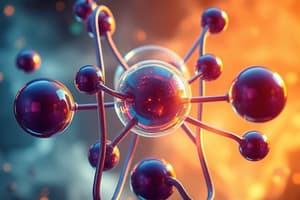Podcast
Questions and Answers
What is the measure of the amount of matter an object has?
What is the measure of the amount of matter an object has?
- Volume
- Density
- Mass (correct)
- Weight
Which of the following is not considered matter?
Which of the following is not considered matter?
- Light (correct)
- Water
- Icebergs
- Gas
Based on the text, what theory explains that all matter is composed of tiny particles called atoms?
Based on the text, what theory explains that all matter is composed of tiny particles called atoms?
- The Molecular Theory of Matter
- Newton's Theory of Matter
- The Particulate Nature of Matter Theory (correct)
- Albert Einstein's Theory of Matter
What is the smallest particle of an element or compound that can exist independently?
What is the smallest particle of an element or compound that can exist independently?
Which state of matter takes the shape of its container?
Which state of matter takes the shape of its container?
What type of motion do the molecules in matter exhibit?
What type of motion do the molecules in matter exhibit?
Flashcards are hidden until you start studying
Study Notes
- Mass is the measure of the amount of matter an object has, while volume is the measure of the space occupied by an object.
- Objects with mass and volume are called matter, while substances like heat and light, which do not have mass or occupy space, are not considered matter.
- Water exists in different states such as icebergs, ocean water, and vapor, showcasing the variety in physical form that matter can take.
- The particulate nature of matter theory explains that all matter is composed of tiny particles called atoms, which are in constant random motion.
- The molecular theory of matter suggests that all matter is made up of molecules which constantly move and attract one another.
- A molecule is a particle consisting of two or more atoms combined in a specific arrangement, and it is the smallest particle of an element or compound that can exist independently.
- Solids have a definite shape and volume, liquids take the shape of their container, and gases have no definite shape or volume and their particles move freely.
Studying That Suits You
Use AI to generate personalized quizzes and flashcards to suit your learning preferences.




